Analyzing Corporate Theories in Business and Professional Ethics
VerifiedAdded on 2020/05/28
|10
|2680
|48
Essay
AI Summary
This essay critically analyzes two contrasting corporate theories: shareholder value theory and stakeholder value theory, within the context of business and professional ethics. It examines the arguments of key figures like Milton Friedman, who advocates for shareholder wealth maximization, and R. Edward Freeman, who champions stakeholder value, emphasizing the importance of considering the interests of all stakeholders. The essay explores the strengths and weaknesses of each perspective, particularly concerning the moral obligations and social responsibilities of business corporations. It further discusses the practical implications of these theories, considering the roles of owners, employees, suppliers, customers, and the community. The analysis includes perspectives from Kenneth Goodpaster and explores how the theories align with practical business operations and ethical considerations, offering insights into the ongoing debate about the purpose and responsibilities of corporations in the modern era.
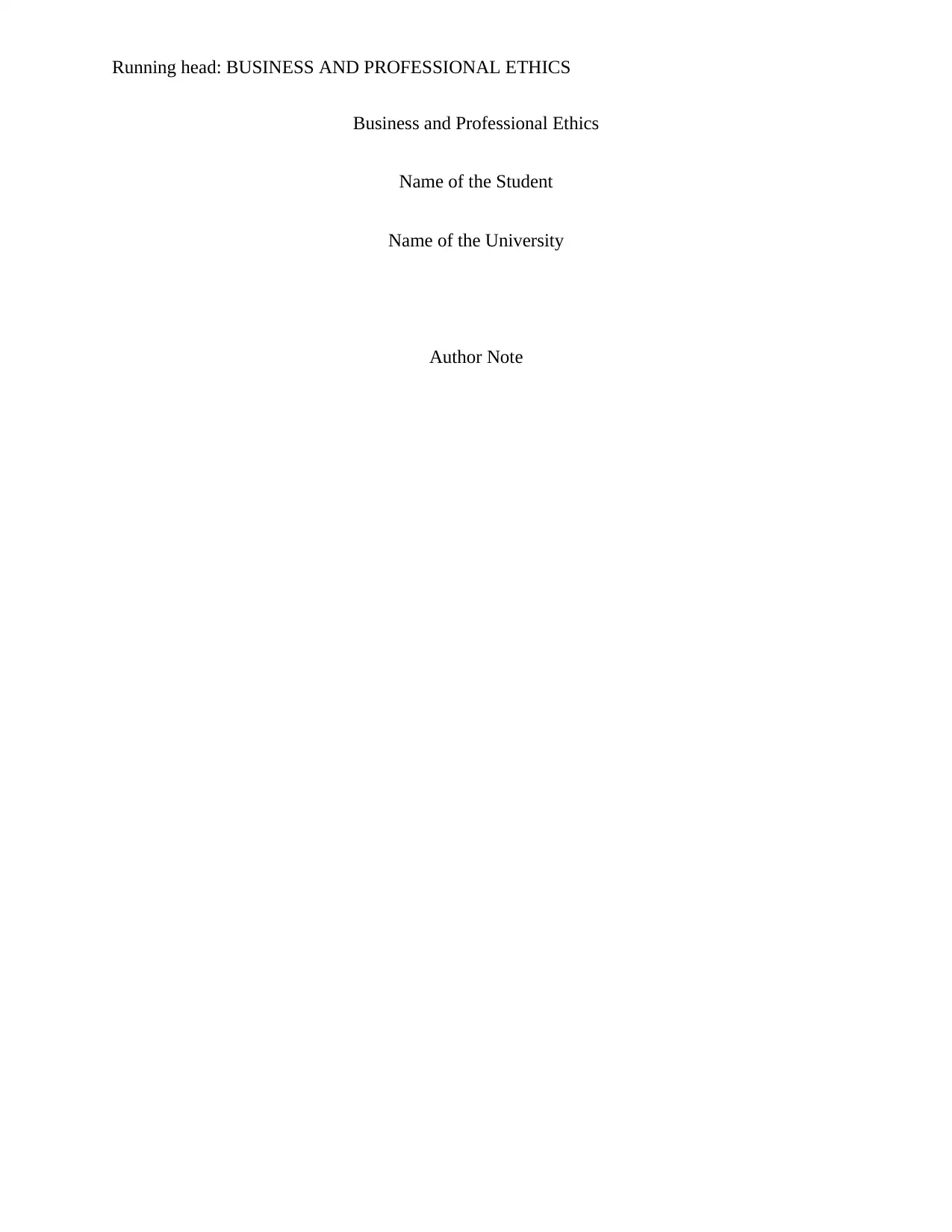
Running head: BUSINESS AND PROFESSIONAL ETHICS
Business and Professional Ethics
Name of the Student
Name of the University
Author Note
Business and Professional Ethics
Name of the Student
Name of the University
Author Note
Paraphrase This Document
Need a fresh take? Get an instant paraphrase of this document with our AI Paraphraser
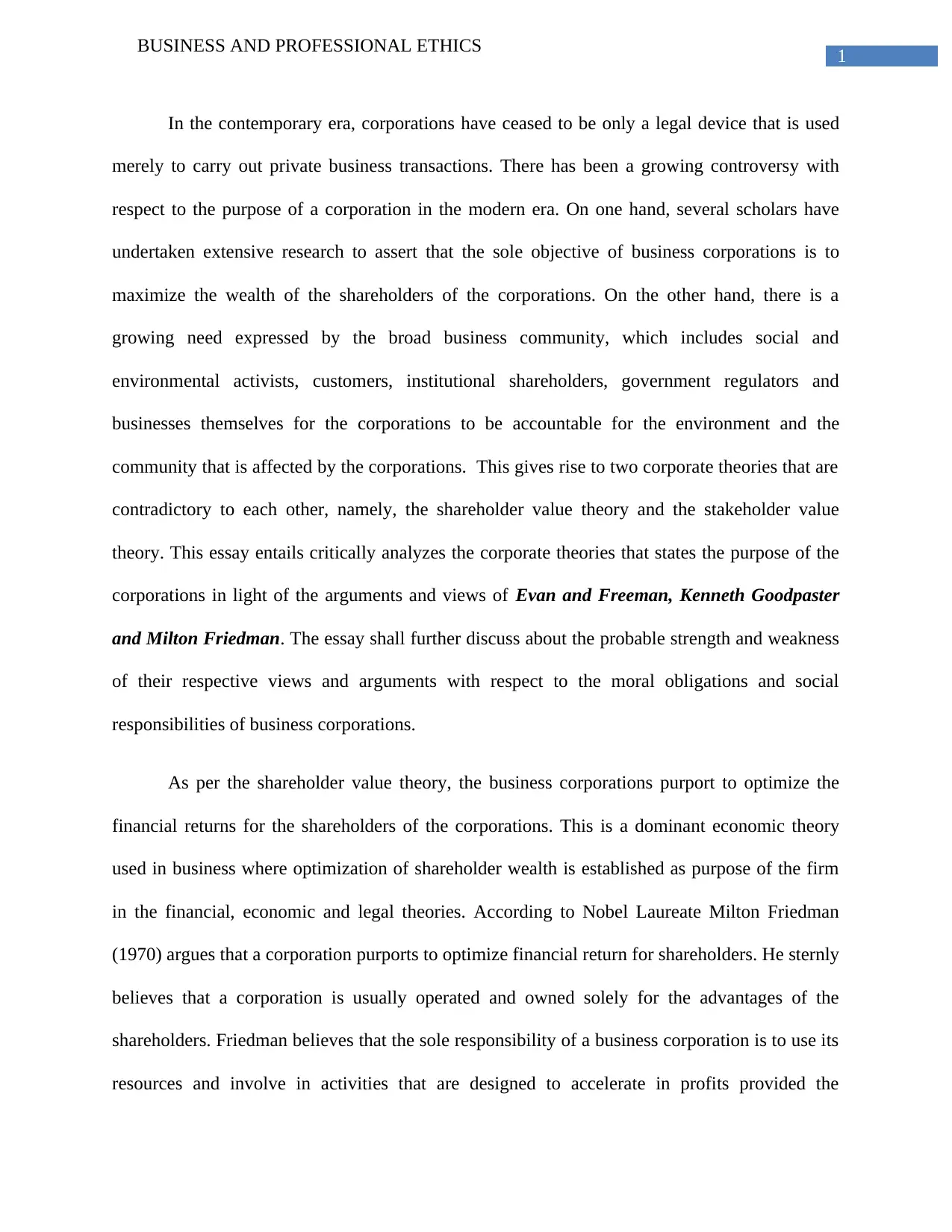
1
BUSINESS AND PROFESSIONAL ETHICS
In the contemporary era, corporations have ceased to be only a legal device that is used
merely to carry out private business transactions. There has been a growing controversy with
respect to the purpose of a corporation in the modern era. On one hand, several scholars have
undertaken extensive research to assert that the sole objective of business corporations is to
maximize the wealth of the shareholders of the corporations. On the other hand, there is a
growing need expressed by the broad business community, which includes social and
environmental activists, customers, institutional shareholders, government regulators and
businesses themselves for the corporations to be accountable for the environment and the
community that is affected by the corporations. This gives rise to two corporate theories that are
contradictory to each other, namely, the shareholder value theory and the stakeholder value
theory. This essay entails critically analyzes the corporate theories that states the purpose of the
corporations in light of the arguments and views of Evan and Freeman, Kenneth Goodpaster
and Milton Friedman. The essay shall further discuss about the probable strength and weakness
of their respective views and arguments with respect to the moral obligations and social
responsibilities of business corporations.
As per the shareholder value theory, the business corporations purport to optimize the
financial returns for the shareholders of the corporations. This is a dominant economic theory
used in business where optimization of shareholder wealth is established as purpose of the firm
in the financial, economic and legal theories. According to Nobel Laureate Milton Friedman
(1970) argues that a corporation purports to optimize financial return for shareholders. He sternly
believes that a corporation is usually operated and owned solely for the advantages of the
shareholders. Friedman believes that the sole responsibility of a business corporation is to use its
resources and involve in activities that are designed to accelerate in profits provided the
BUSINESS AND PROFESSIONAL ETHICS
In the contemporary era, corporations have ceased to be only a legal device that is used
merely to carry out private business transactions. There has been a growing controversy with
respect to the purpose of a corporation in the modern era. On one hand, several scholars have
undertaken extensive research to assert that the sole objective of business corporations is to
maximize the wealth of the shareholders of the corporations. On the other hand, there is a
growing need expressed by the broad business community, which includes social and
environmental activists, customers, institutional shareholders, government regulators and
businesses themselves for the corporations to be accountable for the environment and the
community that is affected by the corporations. This gives rise to two corporate theories that are
contradictory to each other, namely, the shareholder value theory and the stakeholder value
theory. This essay entails critically analyzes the corporate theories that states the purpose of the
corporations in light of the arguments and views of Evan and Freeman, Kenneth Goodpaster
and Milton Friedman. The essay shall further discuss about the probable strength and weakness
of their respective views and arguments with respect to the moral obligations and social
responsibilities of business corporations.
As per the shareholder value theory, the business corporations purport to optimize the
financial returns for the shareholders of the corporations. This is a dominant economic theory
used in business where optimization of shareholder wealth is established as purpose of the firm
in the financial, economic and legal theories. According to Nobel Laureate Milton Friedman
(1970) argues that a corporation purports to optimize financial return for shareholders. He sternly
believes that a corporation is usually operated and owned solely for the advantages of the
shareholders. Friedman believes that the sole responsibility of a business corporation is to use its
resources and involve in activities that are designed to accelerate in profits provided the
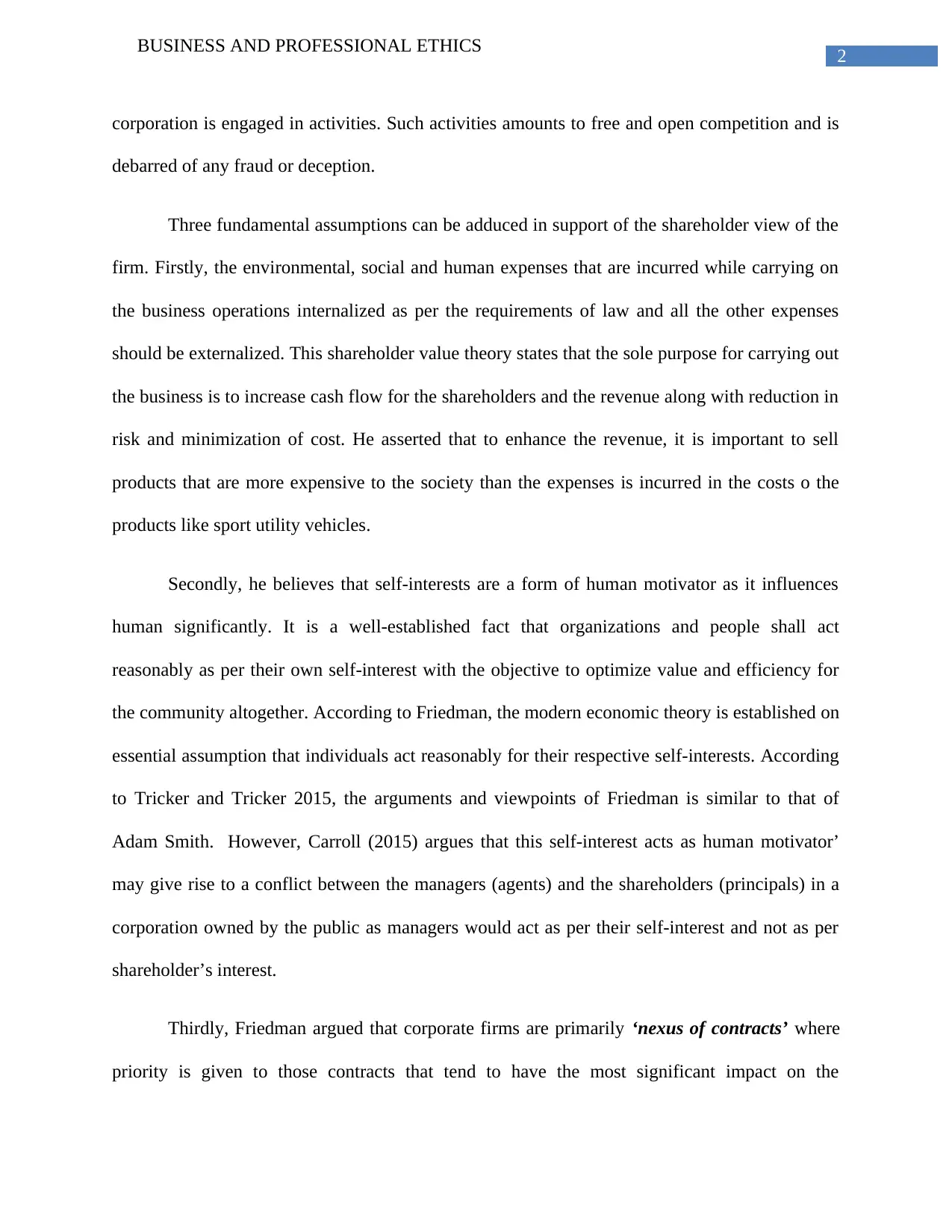
2
BUSINESS AND PROFESSIONAL ETHICS
corporation is engaged in activities. Such activities amounts to free and open competition and is
debarred of any fraud or deception.
Three fundamental assumptions can be adduced in support of the shareholder view of the
firm. Firstly, the environmental, social and human expenses that are incurred while carrying on
the business operations internalized as per the requirements of law and all the other expenses
should be externalized. This shareholder value theory states that the sole purpose for carrying out
the business is to increase cash flow for the shareholders and the revenue along with reduction in
risk and minimization of cost. He asserted that to enhance the revenue, it is important to sell
products that are more expensive to the society than the expenses is incurred in the costs o the
products like sport utility vehicles.
Secondly, he believes that self-interests are a form of human motivator as it influences
human significantly. It is a well-established fact that organizations and people shall act
reasonably as per their own self-interest with the objective to optimize value and efficiency for
the community altogether. According to Friedman, the modern economic theory is established on
essential assumption that individuals act reasonably for their respective self-interests. According
to Tricker and Tricker 2015, the arguments and viewpoints of Friedman is similar to that of
Adam Smith. However, Carroll (2015) argues that this self-interest acts as human motivator’
may give rise to a conflict between the managers (agents) and the shareholders (principals) in a
corporation owned by the public as managers would act as per their self-interest and not as per
shareholder’s interest.
Thirdly, Friedman argued that corporate firms are primarily ‘nexus of contracts’ where
priority is given to those contracts that tend to have the most significant impact on the
BUSINESS AND PROFESSIONAL ETHICS
corporation is engaged in activities. Such activities amounts to free and open competition and is
debarred of any fraud or deception.
Three fundamental assumptions can be adduced in support of the shareholder view of the
firm. Firstly, the environmental, social and human expenses that are incurred while carrying on
the business operations internalized as per the requirements of law and all the other expenses
should be externalized. This shareholder value theory states that the sole purpose for carrying out
the business is to increase cash flow for the shareholders and the revenue along with reduction in
risk and minimization of cost. He asserted that to enhance the revenue, it is important to sell
products that are more expensive to the society than the expenses is incurred in the costs o the
products like sport utility vehicles.
Secondly, he believes that self-interests are a form of human motivator as it influences
human significantly. It is a well-established fact that organizations and people shall act
reasonably as per their own self-interest with the objective to optimize value and efficiency for
the community altogether. According to Friedman, the modern economic theory is established on
essential assumption that individuals act reasonably for their respective self-interests. According
to Tricker and Tricker 2015, the arguments and viewpoints of Friedman is similar to that of
Adam Smith. However, Carroll (2015) argues that this self-interest acts as human motivator’
may give rise to a conflict between the managers (agents) and the shareholders (principals) in a
corporation owned by the public as managers would act as per their self-interest and not as per
shareholder’s interest.
Thirdly, Friedman argued that corporate firms are primarily ‘nexus of contracts’ where
priority is given to those contracts that tend to have the most significant impact on the
⊘ This is a preview!⊘
Do you want full access?
Subscribe today to unlock all pages.

Trusted by 1+ million students worldwide
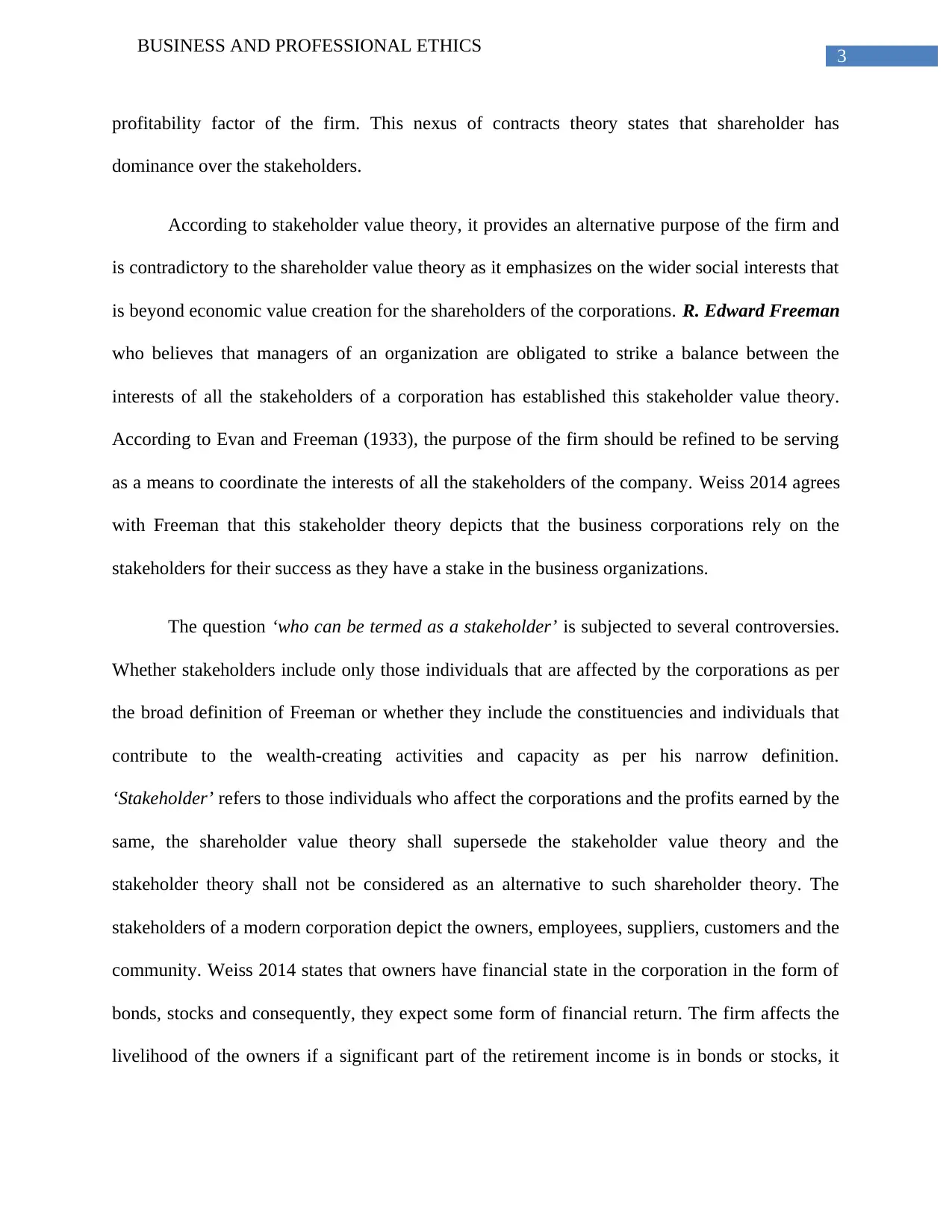
3
BUSINESS AND PROFESSIONAL ETHICS
profitability factor of the firm. This nexus of contracts theory states that shareholder has
dominance over the stakeholders.
According to stakeholder value theory, it provides an alternative purpose of the firm and
is contradictory to the shareholder value theory as it emphasizes on the wider social interests that
is beyond economic value creation for the shareholders of the corporations. R. Edward Freeman
who believes that managers of an organization are obligated to strike a balance between the
interests of all the stakeholders of a corporation has established this stakeholder value theory.
According to Evan and Freeman (1933), the purpose of the firm should be refined to be serving
as a means to coordinate the interests of all the stakeholders of the company. Weiss 2014 agrees
with Freeman that this stakeholder theory depicts that the business corporations rely on the
stakeholders for their success as they have a stake in the business organizations.
The question ‘who can be termed as a stakeholder’ is subjected to several controversies.
Whether stakeholders include only those individuals that are affected by the corporations as per
the broad definition of Freeman or whether they include the constituencies and individuals that
contribute to the wealth-creating activities and capacity as per his narrow definition.
‘Stakeholder’ refers to those individuals who affect the corporations and the profits earned by the
same, the shareholder value theory shall supersede the stakeholder value theory and the
stakeholder theory shall not be considered as an alternative to such shareholder theory. The
stakeholders of a modern corporation depict the owners, employees, suppliers, customers and the
community. Weiss 2014 states that owners have financial state in the corporation in the form of
bonds, stocks and consequently, they expect some form of financial return. The firm affects the
livelihood of the owners if a significant part of the retirement income is in bonds or stocks, it
BUSINESS AND PROFESSIONAL ETHICS
profitability factor of the firm. This nexus of contracts theory states that shareholder has
dominance over the stakeholders.
According to stakeholder value theory, it provides an alternative purpose of the firm and
is contradictory to the shareholder value theory as it emphasizes on the wider social interests that
is beyond economic value creation for the shareholders of the corporations. R. Edward Freeman
who believes that managers of an organization are obligated to strike a balance between the
interests of all the stakeholders of a corporation has established this stakeholder value theory.
According to Evan and Freeman (1933), the purpose of the firm should be refined to be serving
as a means to coordinate the interests of all the stakeholders of the company. Weiss 2014 agrees
with Freeman that this stakeholder theory depicts that the business corporations rely on the
stakeholders for their success as they have a stake in the business organizations.
The question ‘who can be termed as a stakeholder’ is subjected to several controversies.
Whether stakeholders include only those individuals that are affected by the corporations as per
the broad definition of Freeman or whether they include the constituencies and individuals that
contribute to the wealth-creating activities and capacity as per his narrow definition.
‘Stakeholder’ refers to those individuals who affect the corporations and the profits earned by the
same, the shareholder value theory shall supersede the stakeholder value theory and the
stakeholder theory shall not be considered as an alternative to such shareholder theory. The
stakeholders of a modern corporation depict the owners, employees, suppliers, customers and the
community. Weiss 2014 states that owners have financial state in the corporation in the form of
bonds, stocks and consequently, they expect some form of financial return. The firm affects the
livelihood of the owners if a significant part of the retirement income is in bonds or stocks, it
Paraphrase This Document
Need a fresh take? Get an instant paraphrase of this document with our AI Paraphraser
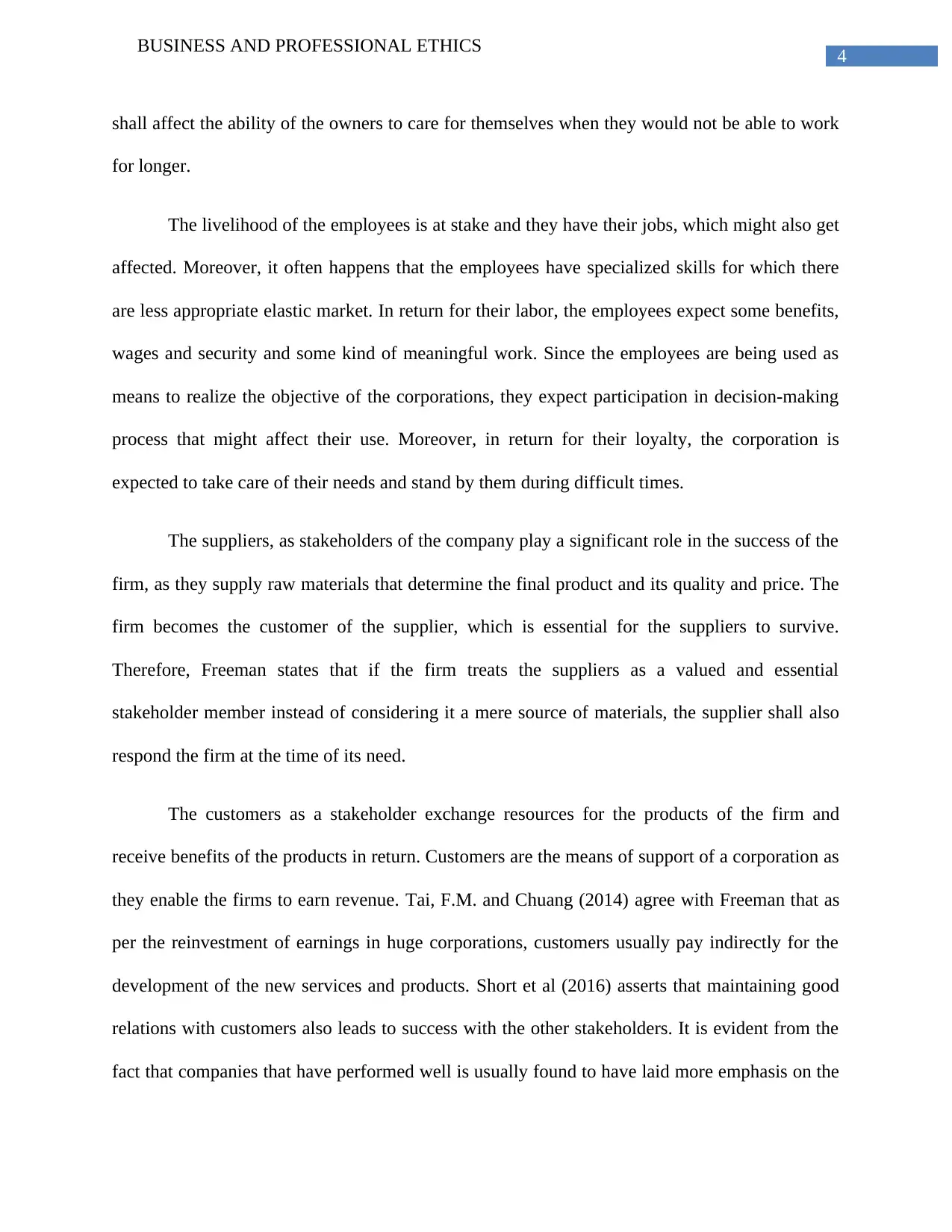
4
BUSINESS AND PROFESSIONAL ETHICS
shall affect the ability of the owners to care for themselves when they would not be able to work
for longer.
The livelihood of the employees is at stake and they have their jobs, which might also get
affected. Moreover, it often happens that the employees have specialized skills for which there
are less appropriate elastic market. In return for their labor, the employees expect some benefits,
wages and security and some kind of meaningful work. Since the employees are being used as
means to realize the objective of the corporations, they expect participation in decision-making
process that might affect their use. Moreover, in return for their loyalty, the corporation is
expected to take care of their needs and stand by them during difficult times.
The suppliers, as stakeholders of the company play a significant role in the success of the
firm, as they supply raw materials that determine the final product and its quality and price. The
firm becomes the customer of the supplier, which is essential for the suppliers to survive.
Therefore, Freeman states that if the firm treats the suppliers as a valued and essential
stakeholder member instead of considering it a mere source of materials, the supplier shall also
respond the firm at the time of its need.
The customers as a stakeholder exchange resources for the products of the firm and
receive benefits of the products in return. Customers are the means of support of a corporation as
they enable the firms to earn revenue. Tai, F.M. and Chuang (2014) agree with Freeman that as
per the reinvestment of earnings in huge corporations, customers usually pay indirectly for the
development of the new services and products. Short et al (2016) asserts that maintaining good
relations with customers also leads to success with the other stakeholders. It is evident from the
fact that companies that have performed well is usually found to have laid more emphasis on the
BUSINESS AND PROFESSIONAL ETHICS
shall affect the ability of the owners to care for themselves when they would not be able to work
for longer.
The livelihood of the employees is at stake and they have their jobs, which might also get
affected. Moreover, it often happens that the employees have specialized skills for which there
are less appropriate elastic market. In return for their labor, the employees expect some benefits,
wages and security and some kind of meaningful work. Since the employees are being used as
means to realize the objective of the corporations, they expect participation in decision-making
process that might affect their use. Moreover, in return for their loyalty, the corporation is
expected to take care of their needs and stand by them during difficult times.
The suppliers, as stakeholders of the company play a significant role in the success of the
firm, as they supply raw materials that determine the final product and its quality and price. The
firm becomes the customer of the supplier, which is essential for the suppliers to survive.
Therefore, Freeman states that if the firm treats the suppliers as a valued and essential
stakeholder member instead of considering it a mere source of materials, the supplier shall also
respond the firm at the time of its need.
The customers as a stakeholder exchange resources for the products of the firm and
receive benefits of the products in return. Customers are the means of support of a corporation as
they enable the firms to earn revenue. Tai, F.M. and Chuang (2014) agree with Freeman that as
per the reinvestment of earnings in huge corporations, customers usually pay indirectly for the
development of the new services and products. Short et al (2016) asserts that maintaining good
relations with customers also leads to success with the other stakeholders. It is evident from the
fact that companies that have performed well is usually found to have laid more emphasis on the
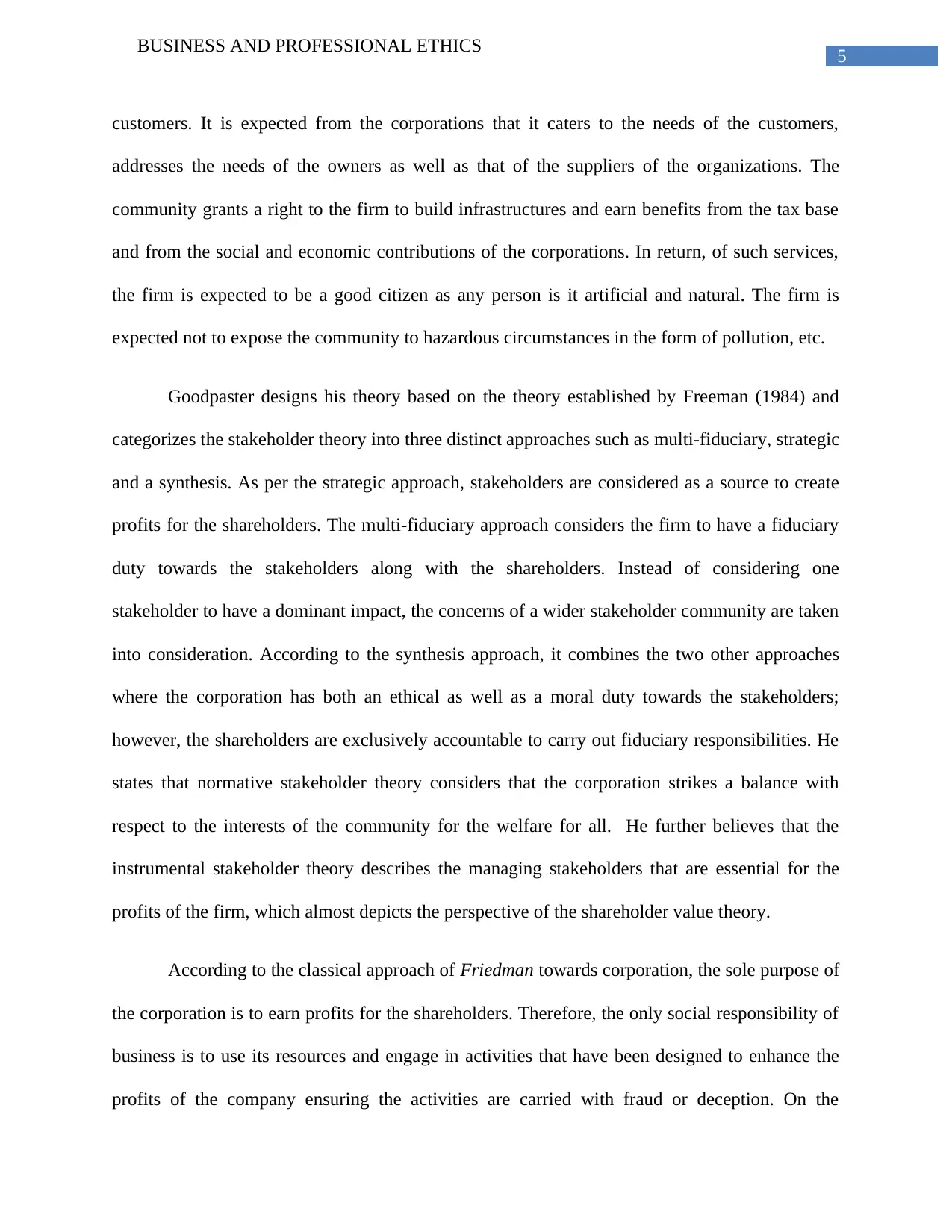
5
BUSINESS AND PROFESSIONAL ETHICS
customers. It is expected from the corporations that it caters to the needs of the customers,
addresses the needs of the owners as well as that of the suppliers of the organizations. The
community grants a right to the firm to build infrastructures and earn benefits from the tax base
and from the social and economic contributions of the corporations. In return, of such services,
the firm is expected to be a good citizen as any person is it artificial and natural. The firm is
expected not to expose the community to hazardous circumstances in the form of pollution, etc.
Goodpaster designs his theory based on the theory established by Freeman (1984) and
categorizes the stakeholder theory into three distinct approaches such as multi-fiduciary, strategic
and a synthesis. As per the strategic approach, stakeholders are considered as a source to create
profits for the shareholders. The multi-fiduciary approach considers the firm to have a fiduciary
duty towards the stakeholders along with the shareholders. Instead of considering one
stakeholder to have a dominant impact, the concerns of a wider stakeholder community are taken
into consideration. According to the synthesis approach, it combines the two other approaches
where the corporation has both an ethical as well as a moral duty towards the stakeholders;
however, the shareholders are exclusively accountable to carry out fiduciary responsibilities. He
states that normative stakeholder theory considers that the corporation strikes a balance with
respect to the interests of the community for the welfare for all. He further believes that the
instrumental stakeholder theory describes the managing stakeholders that are essential for the
profits of the firm, which almost depicts the perspective of the shareholder value theory.
According to the classical approach of Friedman towards corporation, the sole purpose of
the corporation is to earn profits for the shareholders. Therefore, the only social responsibility of
business is to use its resources and engage in activities that have been designed to enhance the
profits of the company ensuring the activities are carried with fraud or deception. On the
BUSINESS AND PROFESSIONAL ETHICS
customers. It is expected from the corporations that it caters to the needs of the customers,
addresses the needs of the owners as well as that of the suppliers of the organizations. The
community grants a right to the firm to build infrastructures and earn benefits from the tax base
and from the social and economic contributions of the corporations. In return, of such services,
the firm is expected to be a good citizen as any person is it artificial and natural. The firm is
expected not to expose the community to hazardous circumstances in the form of pollution, etc.
Goodpaster designs his theory based on the theory established by Freeman (1984) and
categorizes the stakeholder theory into three distinct approaches such as multi-fiduciary, strategic
and a synthesis. As per the strategic approach, stakeholders are considered as a source to create
profits for the shareholders. The multi-fiduciary approach considers the firm to have a fiduciary
duty towards the stakeholders along with the shareholders. Instead of considering one
stakeholder to have a dominant impact, the concerns of a wider stakeholder community are taken
into consideration. According to the synthesis approach, it combines the two other approaches
where the corporation has both an ethical as well as a moral duty towards the stakeholders;
however, the shareholders are exclusively accountable to carry out fiduciary responsibilities. He
states that normative stakeholder theory considers that the corporation strikes a balance with
respect to the interests of the community for the welfare for all. He further believes that the
instrumental stakeholder theory describes the managing stakeholders that are essential for the
profits of the firm, which almost depicts the perspective of the shareholder value theory.
According to the classical approach of Friedman towards corporation, the sole purpose of
the corporation is to earn profits for the shareholders. Therefore, the only social responsibility of
business is to use its resources and engage in activities that have been designed to enhance the
profits of the company ensuring the activities are carried with fraud or deception. On the
⊘ This is a preview!⊘
Do you want full access?
Subscribe today to unlock all pages.

Trusted by 1+ million students worldwide
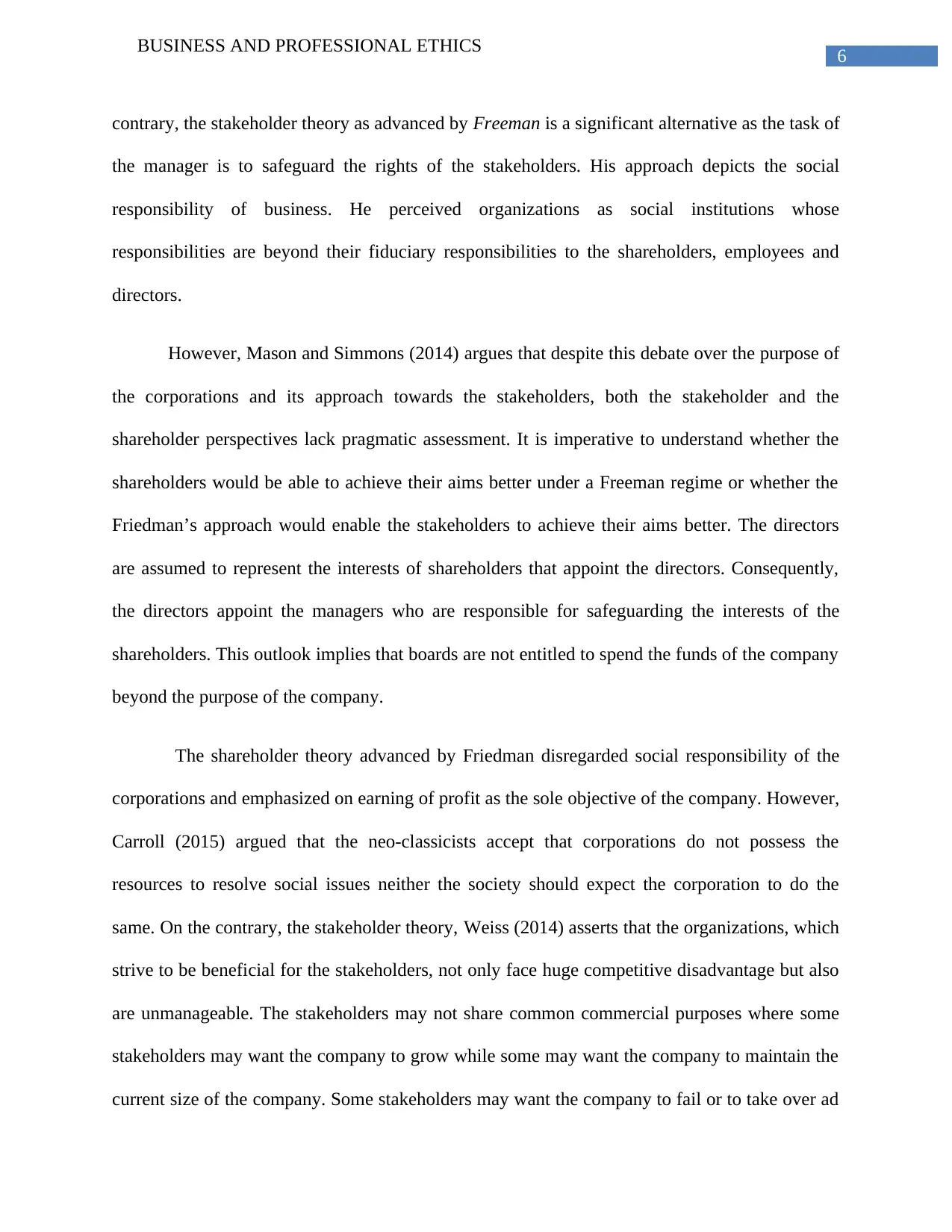
6
BUSINESS AND PROFESSIONAL ETHICS
contrary, the stakeholder theory as advanced by Freeman is a significant alternative as the task of
the manager is to safeguard the rights of the stakeholders. His approach depicts the social
responsibility of business. He perceived organizations as social institutions whose
responsibilities are beyond their fiduciary responsibilities to the shareholders, employees and
directors.
However, Mason and Simmons (2014) argues that despite this debate over the purpose of
the corporations and its approach towards the stakeholders, both the stakeholder and the
shareholder perspectives lack pragmatic assessment. It is imperative to understand whether the
shareholders would be able to achieve their aims better under a Freeman regime or whether the
Friedman’s approach would enable the stakeholders to achieve their aims better. The directors
are assumed to represent the interests of shareholders that appoint the directors. Consequently,
the directors appoint the managers who are responsible for safeguarding the interests of the
shareholders. This outlook implies that boards are not entitled to spend the funds of the company
beyond the purpose of the company.
The shareholder theory advanced by Friedman disregarded social responsibility of the
corporations and emphasized on earning of profit as the sole objective of the company. However,
Carroll (2015) argued that the neo-classicists accept that corporations do not possess the
resources to resolve social issues neither the society should expect the corporation to do the
same. On the contrary, the stakeholder theory, Weiss (2014) asserts that the organizations, which
strive to be beneficial for the stakeholders, not only face huge competitive disadvantage but also
are unmanageable. The stakeholders may not share common commercial purposes where some
stakeholders may want the company to grow while some may want the company to maintain the
current size of the company. Some stakeholders may want the company to fail or to take over ad
BUSINESS AND PROFESSIONAL ETHICS
contrary, the stakeholder theory as advanced by Freeman is a significant alternative as the task of
the manager is to safeguard the rights of the stakeholders. His approach depicts the social
responsibility of business. He perceived organizations as social institutions whose
responsibilities are beyond their fiduciary responsibilities to the shareholders, employees and
directors.
However, Mason and Simmons (2014) argues that despite this debate over the purpose of
the corporations and its approach towards the stakeholders, both the stakeholder and the
shareholder perspectives lack pragmatic assessment. It is imperative to understand whether the
shareholders would be able to achieve their aims better under a Freeman regime or whether the
Friedman’s approach would enable the stakeholders to achieve their aims better. The directors
are assumed to represent the interests of shareholders that appoint the directors. Consequently,
the directors appoint the managers who are responsible for safeguarding the interests of the
shareholders. This outlook implies that boards are not entitled to spend the funds of the company
beyond the purpose of the company.
The shareholder theory advanced by Friedman disregarded social responsibility of the
corporations and emphasized on earning of profit as the sole objective of the company. However,
Carroll (2015) argued that the neo-classicists accept that corporations do not possess the
resources to resolve social issues neither the society should expect the corporation to do the
same. On the contrary, the stakeholder theory, Weiss (2014) asserts that the organizations, which
strive to be beneficial for the stakeholders, not only face huge competitive disadvantage but also
are unmanageable. The stakeholders may not share common commercial purposes where some
stakeholders may want the company to grow while some may want the company to maintain the
current size of the company. Some stakeholders may want the company to fail or to take over ad
Paraphrase This Document
Need a fresh take? Get an instant paraphrase of this document with our AI Paraphraser
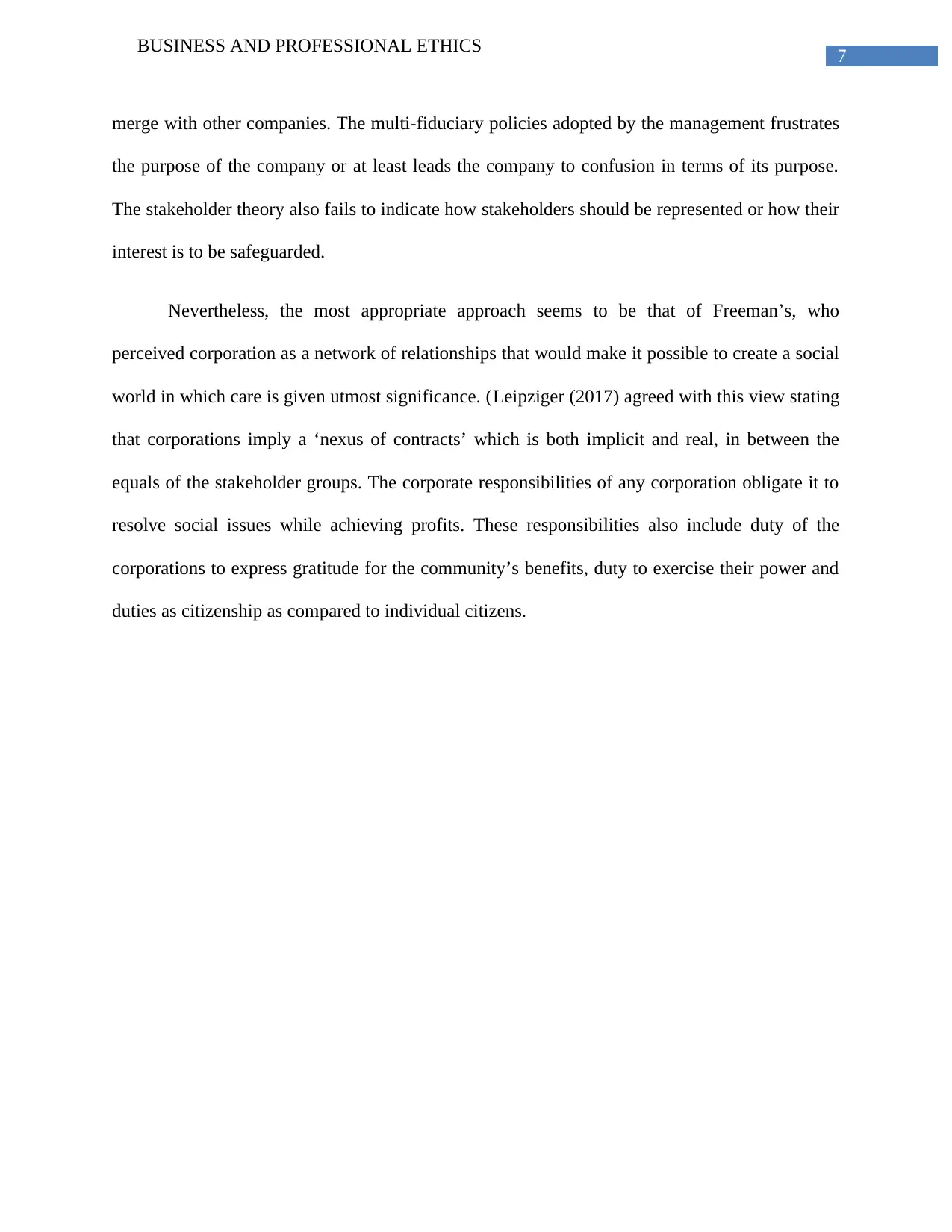
7
BUSINESS AND PROFESSIONAL ETHICS
merge with other companies. The multi-fiduciary policies adopted by the management frustrates
the purpose of the company or at least leads the company to confusion in terms of its purpose.
The stakeholder theory also fails to indicate how stakeholders should be represented or how their
interest is to be safeguarded.
Nevertheless, the most appropriate approach seems to be that of Freeman’s, who
perceived corporation as a network of relationships that would make it possible to create a social
world in which care is given utmost significance. (Leipziger (2017) agreed with this view stating
that corporations imply a ‘nexus of contracts’ which is both implicit and real, in between the
equals of the stakeholder groups. The corporate responsibilities of any corporation obligate it to
resolve social issues while achieving profits. These responsibilities also include duty of the
corporations to express gratitude for the community’s benefits, duty to exercise their power and
duties as citizenship as compared to individual citizens.
BUSINESS AND PROFESSIONAL ETHICS
merge with other companies. The multi-fiduciary policies adopted by the management frustrates
the purpose of the company or at least leads the company to confusion in terms of its purpose.
The stakeholder theory also fails to indicate how stakeholders should be represented or how their
interest is to be safeguarded.
Nevertheless, the most appropriate approach seems to be that of Freeman’s, who
perceived corporation as a network of relationships that would make it possible to create a social
world in which care is given utmost significance. (Leipziger (2017) agreed with this view stating
that corporations imply a ‘nexus of contracts’ which is both implicit and real, in between the
equals of the stakeholder groups. The corporate responsibilities of any corporation obligate it to
resolve social issues while achieving profits. These responsibilities also include duty of the
corporations to express gratitude for the community’s benefits, duty to exercise their power and
duties as citizenship as compared to individual citizens.
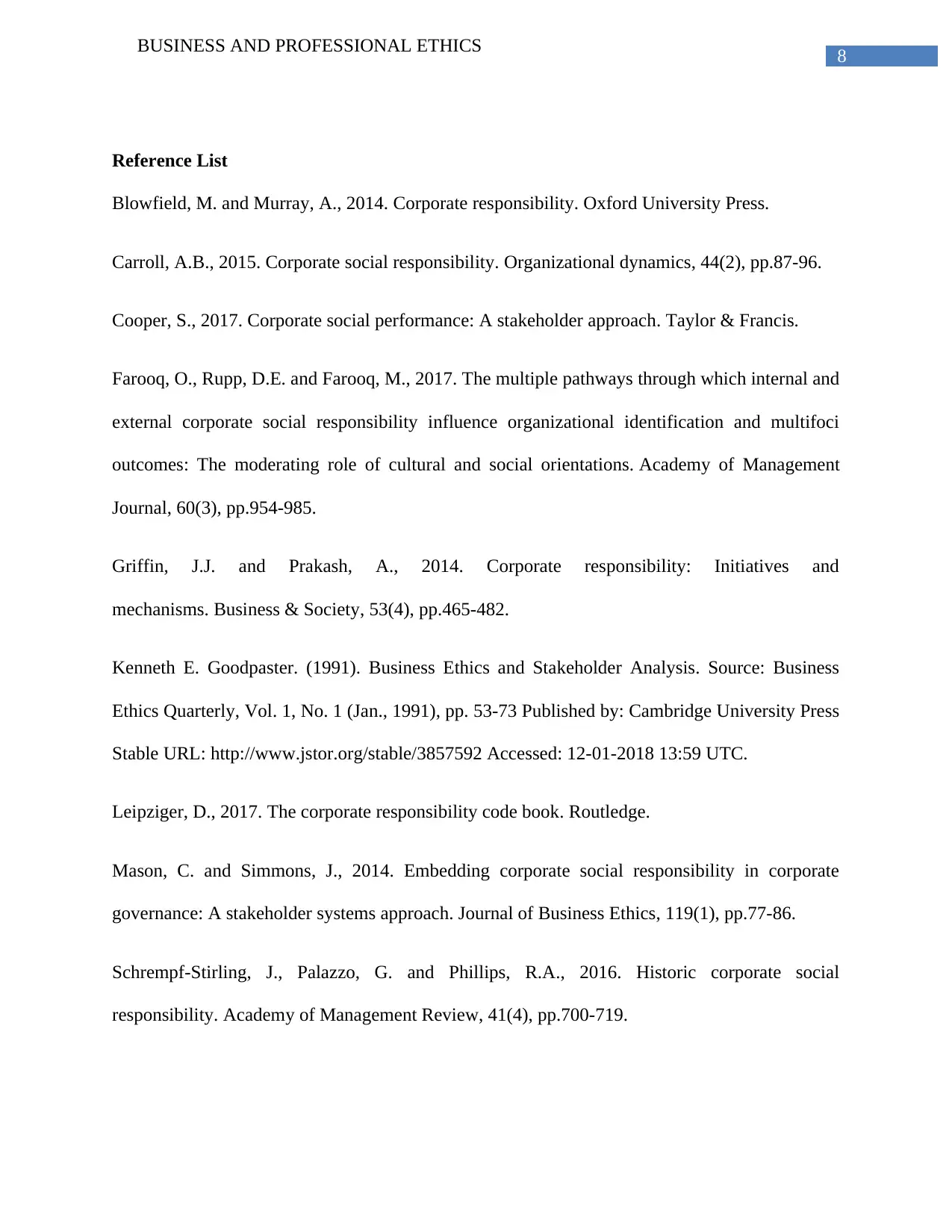
8
BUSINESS AND PROFESSIONAL ETHICS
Reference List
Blowfield, M. and Murray, A., 2014. Corporate responsibility. Oxford University Press.
Carroll, A.B., 2015. Corporate social responsibility. Organizational dynamics, 44(2), pp.87-96.
Cooper, S., 2017. Corporate social performance: A stakeholder approach. Taylor & Francis.
Farooq, O., Rupp, D.E. and Farooq, M., 2017. The multiple pathways through which internal and
external corporate social responsibility influence organizational identification and multifoci
outcomes: The moderating role of cultural and social orientations. Academy of Management
Journal, 60(3), pp.954-985.
Griffin, J.J. and Prakash, A., 2014. Corporate responsibility: Initiatives and
mechanisms. Business & Society, 53(4), pp.465-482.
Kenneth E. Goodpaster. (1991). Business Ethics and Stakeholder Analysis. Source: Business
Ethics Quarterly, Vol. 1, No. 1 (Jan., 1991), pp. 53-73 Published by: Cambridge University Press
Stable URL: http://www.jstor.org/stable/3857592 Accessed: 12-01-2018 13:59 UTC.
Leipziger, D., 2017. The corporate responsibility code book. Routledge.
Mason, C. and Simmons, J., 2014. Embedding corporate social responsibility in corporate
governance: A stakeholder systems approach. Journal of Business Ethics, 119(1), pp.77-86.
Schrempf-Stirling, J., Palazzo, G. and Phillips, R.A., 2016. Historic corporate social
responsibility. Academy of Management Review, 41(4), pp.700-719.
BUSINESS AND PROFESSIONAL ETHICS
Reference List
Blowfield, M. and Murray, A., 2014. Corporate responsibility. Oxford University Press.
Carroll, A.B., 2015. Corporate social responsibility. Organizational dynamics, 44(2), pp.87-96.
Cooper, S., 2017. Corporate social performance: A stakeholder approach. Taylor & Francis.
Farooq, O., Rupp, D.E. and Farooq, M., 2017. The multiple pathways through which internal and
external corporate social responsibility influence organizational identification and multifoci
outcomes: The moderating role of cultural and social orientations. Academy of Management
Journal, 60(3), pp.954-985.
Griffin, J.J. and Prakash, A., 2014. Corporate responsibility: Initiatives and
mechanisms. Business & Society, 53(4), pp.465-482.
Kenneth E. Goodpaster. (1991). Business Ethics and Stakeholder Analysis. Source: Business
Ethics Quarterly, Vol. 1, No. 1 (Jan., 1991), pp. 53-73 Published by: Cambridge University Press
Stable URL: http://www.jstor.org/stable/3857592 Accessed: 12-01-2018 13:59 UTC.
Leipziger, D., 2017. The corporate responsibility code book. Routledge.
Mason, C. and Simmons, J., 2014. Embedding corporate social responsibility in corporate
governance: A stakeholder systems approach. Journal of Business Ethics, 119(1), pp.77-86.
Schrempf-Stirling, J., Palazzo, G. and Phillips, R.A., 2016. Historic corporate social
responsibility. Academy of Management Review, 41(4), pp.700-719.
⊘ This is a preview!⊘
Do you want full access?
Subscribe today to unlock all pages.

Trusted by 1+ million students worldwide
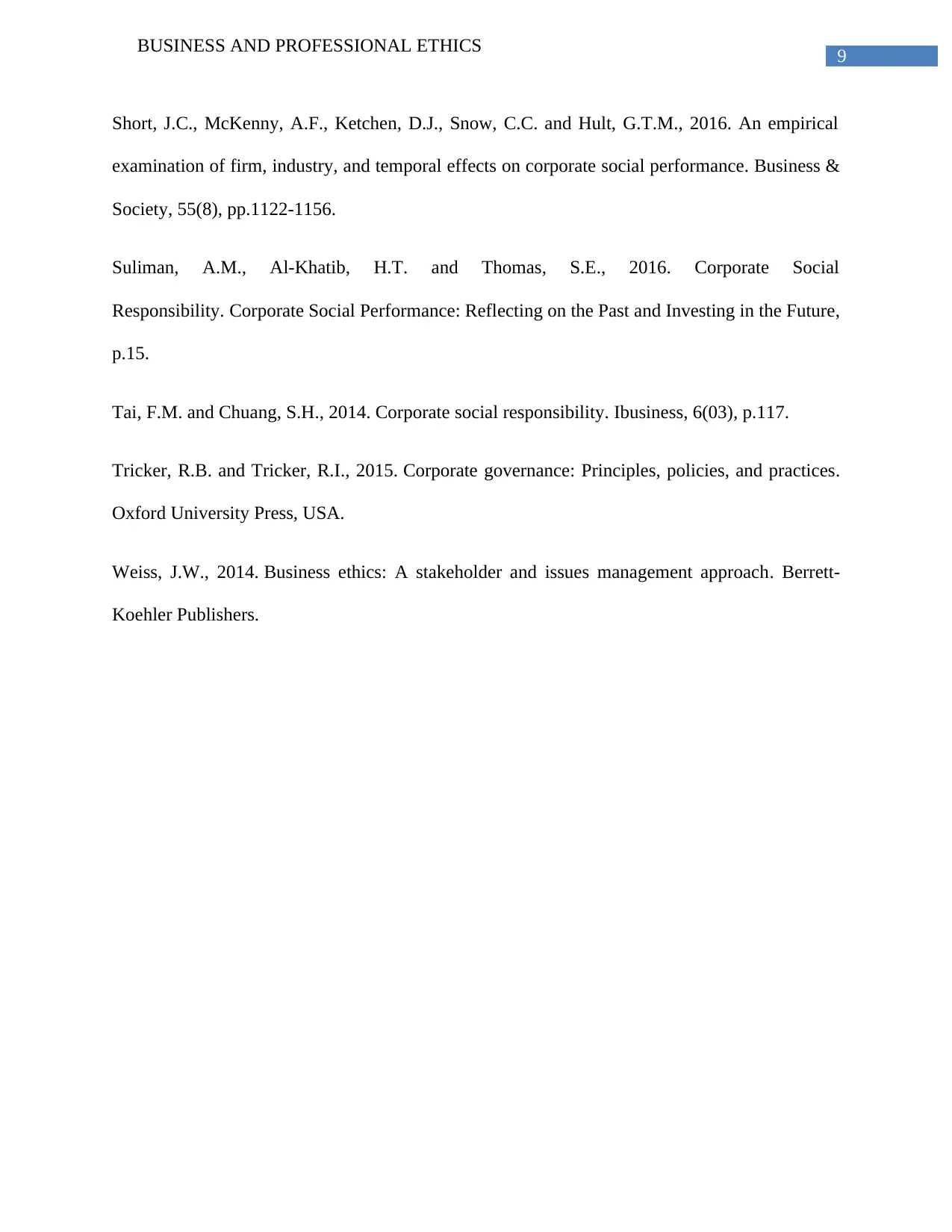
9
BUSINESS AND PROFESSIONAL ETHICS
Short, J.C., McKenny, A.F., Ketchen, D.J., Snow, C.C. and Hult, G.T.M., 2016. An empirical
examination of firm, industry, and temporal effects on corporate social performance. Business &
Society, 55(8), pp.1122-1156.
Suliman, A.M., Al-Khatib, H.T. and Thomas, S.E., 2016. Corporate Social
Responsibility. Corporate Social Performance: Reflecting on the Past and Investing in the Future,
p.15.
Tai, F.M. and Chuang, S.H., 2014. Corporate social responsibility. Ibusiness, 6(03), p.117.
Tricker, R.B. and Tricker, R.I., 2015. Corporate governance: Principles, policies, and practices.
Oxford University Press, USA.
Weiss, J.W., 2014. Business ethics: A stakeholder and issues management approach. Berrett-
Koehler Publishers.
BUSINESS AND PROFESSIONAL ETHICS
Short, J.C., McKenny, A.F., Ketchen, D.J., Snow, C.C. and Hult, G.T.M., 2016. An empirical
examination of firm, industry, and temporal effects on corporate social performance. Business &
Society, 55(8), pp.1122-1156.
Suliman, A.M., Al-Khatib, H.T. and Thomas, S.E., 2016. Corporate Social
Responsibility. Corporate Social Performance: Reflecting on the Past and Investing in the Future,
p.15.
Tai, F.M. and Chuang, S.H., 2014. Corporate social responsibility. Ibusiness, 6(03), p.117.
Tricker, R.B. and Tricker, R.I., 2015. Corporate governance: Principles, policies, and practices.
Oxford University Press, USA.
Weiss, J.W., 2014. Business ethics: A stakeholder and issues management approach. Berrett-
Koehler Publishers.
1 out of 10
Related Documents
Your All-in-One AI-Powered Toolkit for Academic Success.
+13062052269
info@desklib.com
Available 24*7 on WhatsApp / Email
![[object Object]](/_next/static/media/star-bottom.7253800d.svg)
Unlock your academic potential
Copyright © 2020–2026 A2Z Services. All Rights Reserved. Developed and managed by ZUCOL.




